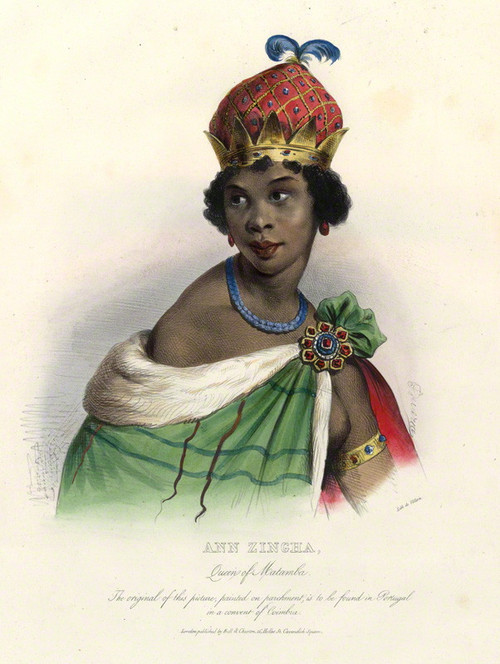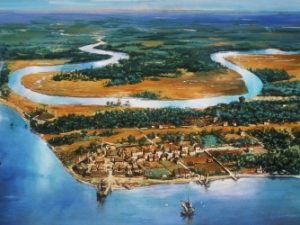Queen Njinga was the ruler of the Kingdom of Ndongo and the Kingdom of Matamba, a Queen of two nations, an enemy of the Portuguese, and a warrior to her people. Through a long-standing conflict between the Kingdom of Ndongo and the Portuguese, Queen Njinga dedicated more than half her life salvaging her kingdom from destruction. Her people were constantly attacked and lived in terror as the Portuguese invaded, and established a slave trade, and viciously murdered the population.1 Queen Njinga used amazing negotiation skills, acquired diplomacy knowledge, and utilized guerrilla warfare as a multifaceted approach to overthrow the Portuguese. Even though she fought fiercely and persistently for her people, she is scarcely mentioned in the pages of history. Countless books have been written regarding Queens of nations, but there is only one known book written in English about her life. Her story began in war.
In 1580, war broke out between the Ndongo and the Portuguese. There was bloodshed, and death lingered in the kingdom. Cries of innocent children being stripped away from their mothers and fathers, and being forced into cages that only led to death; it was an era of great anguish for the Ndongo people. Amidst this dark era, a new light shined in the kingdom, as a baby girl named Nzinga Mbandi was born. She was the daughter of King Kiluanji of Ndongo and what laid ahead was uncertain, due to her timing of birth. Legends say that when she was born, she had an umbilical cord wrapped around her neck. To the villagers, being born in such a way was a sign that that one would grow to become a powerful and proud person. Of course, Ndongo’s early years in a war-torn country led to a different kind of childhood. Instead of playing with children in the village, she attended diplomatic meetings with her father. Instead of getting to see the beautiful place she called home, she was forced to stay indoors as the outside was far too dangerous. With constant battles, Nzinga had to quickly learn how to survive and how to behave. This led her to grow up fierce, strong, and incredibly intelligent. Many viewed Nzinga Mbande as her father’s favorite. She was her father’s pride and joy, and throughout her childhood grew to understand the governance of the kingdom. She was able to witness her father take charge and protect his people. However, this favoritism did not go unnoticed.2
Disaster struck the kingdom in 1617, when her father died and the throne was given to the eldest, her cowardly brother Ngola. What created the depiction of him being cowardly was his incapacity to meet the expectations set by his family. He grew to be disrespected by the Portuguese government and his own people. This critique of him as a leader drove him mad. He felt paranoid that one day Nzinga’s only son would plot to have him assassinated. So instead, he ordered her son killed. He then forcibly had Nzinga sterilized, which ensured that she would never have a child again.3 He was seen as someone who didn’t have enough backbone to run a kingdom and he knew it himself. Everything he attempted failed, and he was viewed as a weak leader in the eyes of the Portuguese. Instead of creating diplomatic ties with the Portuguese, he waged war. He quickly scrambled together a large army to fight the Portuguese. Little did he know that the Portuguese also had plans to attack and conquer, and Ngola was no match.4 His war failed, as he couldn’t keep up with the constant attacks. Many lives were taken, villages burned, innocent children killed, and families torn apart. Due to high death tolls and Portuguese captives, the slave-trade became nearly impossible. As a result, Ngola decided to negotiate a peace treaty. Ngola knew that Nzinga was the only one who could negotiate this treaty, as she spoke fluent Portuguese. Nzinga was in pieces when she had heard the horrible stories that had happened to her people. This lead her to the decision to accept Ngola’s wishes and speak on his behalf.

This meeting became the most significant meeting in her life. Nzinga left for Luanda to negotiate the treaty with Dom João Correia de Sousa, the Portuguese Governor. She left with her head held high and pride running through her veins. On her journey she was engulfed with horror as she saw her people suffering. She watched, lost for words, as she saw them being sold into slavery.5 When she made her way to the room where negotiations would be made, she noticed there were chairs for the Portuguese individuals and only a mat provided for her. This type of behavior from the Portuguese was common; it was their way of displaying a “subordinate status, a status reserved for conquered Africans.” To subvert this disrespect, she had her maid be her chair while she spoke to the governor face to face. She made it clear to him that this was not a meeting where she would bow down to the Portuguese, but rather one where they would act as equals. This not only completed the task presented by her brother, but also enhanced her status. She wanted to be able to trade for firearms and other things necessary to strengthen her army. Unfortunately, she knew that the slave trade business would be the only way to eventually defeat the Portuguese and stop the over deportation of slaves. She negotiated to ship a certain amount of slaves to the Portuguese in exchange for firearms. Njinga knew that this would be the only way to stop slave trading of her people in the future. While the treaty was a success, it did require her conversion to Christianity, and she later changed her name to Anna de Sousa.6

This peace was short lived, as her brother had a sudden death. Her brother died of mysterious causes. Some accounts say that it was Nzinga who poisoned him.7 She wanted revenge for the death of her young child. Shortly after his death, the Portuguese went back on their agreement and declared war on Njinga as well as on other nearby tribes. This forced the new Queen to retreat and lead her people to the Kingdom of Matamba. Here she kidnapped Matamba’s Queen and army. From there, she made herself Queen and took over the kingdom. In the year 1641, Nzinga created an alliance between the Kingdom of Kongo and the Dutch.8 They had created this alliance with a vision of defeating the Portuguese and regaining the Kingdom of Ndongo, as well as protecting her people.
At this time, the Portuguese had continued to terrorize her land by developing headquarters in the town of Masangano. By the year 1644, she was able to conquer the Portuguese army that occupied Ngoleme. Unfortunately, this victory was short lived when she was unable to win the battle in Kavanga, the northern part of Ngondo.9 To make matters worse, her sister was captured by the Portuguese and, when they learned of her sister revealing valuable secrets to Nzinga, they killed her.10
Soon after, the Dutch, located in Luanda where Nzinga resided, sent reinforcements. Nzinga was able to track the Portuguese army and plan an attack. Despite her preparations, she was unable to defeat them. This led to the army then recapturing Luanda.11 She was determined to defeat the Portuguese and regain her land. She implemented guerrilla warfare on the Portuguese and fought fiercely for the next thirty years. In those thirty years, she created false alliances with neighboring kingdoms, used her mastered skill of negotiation with the Portuguese and Dutch, and offered protection for refugees who fled to her kingdom. Njinga’s negotiation skills were so successful because of her pride as well as her love for her culture and people. The clever use of her gender and her political understandings helped lay a foundation for future leaders of Ndongo today. She made it clear that she was not someone to mess with.
Queen Nzinga was willing to use her role as a woman as well as her role of the Queen of Ndongo. The humble beginnings of Nzinga’s guerilla tactics started in 1626, as Bento Cardoso, a leading general of Portugal, set out an army to defeat this troublesome queen.12 When the battle began, Nzinga had no allies that could help her. Even her closest supporters from her mother’s birth place of Pebo were imprisoned and sold into slavery. Not only was her army small, but as time progressed Cardoso gained more and more soldiers. Nzinga had begun to order trenches to be made around her island, created hidden caves, and stocked up on supplies to prepare her people for a potential long standing siege.13 She made sure that her army would be prepared and her communication with her army was impeccable. This led her to slowly become a political icon and fierce fighter. She never lost hope of regaining her land and knew deep in her heart that Ndongo would soon be returned. Her vision soon turned to reality when Salvador Correia, who was new to the land, realized that he could do nothing against this highly regarded fierce Queen, who by now was more than 70 years of age. The Portuguese then had decided to give up their claims to Ndongo and the land was returned to its rightful owner through a treaty ratified in Lisbon by King Pedro VI on November 24 1657.14
She then spent the rest of her days rebuilding her once lost kingdom. She will be remembered as the Mother of Angola, the fighter of negotiations, and the protector of her people. She is still honored throughout Africa as a remarkable leader and woman.

- Linda M. Heywood, Njinga of Angola: Africa’s Warrior Queen (Cambridge, Massachusetts: Harvard University Press 2017), 1. ↵
- Linda M. Heywood, Njinga of Angola : Africa’s Warrior Queen (Cambridge, Massachusetts : Harvard University Press, 2017), 56, 57, 58, 80-81. ↵
- Linda M. Heywood, Njinga of Angola : Africa’s Warrior Queen (Cambridge, Massachusetts : Harvard University Press, 2017., 2017), 50; “Njinga Mbandi: Queen of Ndongo and Matamba,” UNESCO Digital Library (website), accessed April 4, 2019, https://unesdoc.unesco.org/ark:/48223/pf0000230103; “Nzinga of Ndongo and Matamba . ↵
- Linda M. Heywood, Njinga of Angola : Africa’s Warrior Queen (Cambridge, Massachusetts : Harvard University Press, 2017., 2017), 44-46. ↵
- Linda M. Heywood, Njinga of Angola : Africa’s Warrior Queen (Cambridge, Massachusetts : Harvard University Press, 2017., 2017), 50; “Njinga Mbandi: Queen of Ndongo and Matamba,” UNESCO Digital Library (website), accessed April 4, 2019, https://unesdoc.unesco.org/ark:/48223/pf0000230103; “Nzinga of Ndongo and Matamba . ↵
- Linda M. Heywood, Njinga of Angola : Africa’s Warrior Queen (Cambridge, Massachusetts : Harvard University Press, 2017., 2017), 61-62. ↵
- Christine Saidi, “Njinga of Angola: Africa’s Warrior Queen,” Early Modern Women: An Interdisciplinary Journal 13, no. 1 (Fall 2018): 183–85. ↵
- Pat Masioni et al., “Njinga Mbandi: Queen of Ndongo and Matamba,” UNESCO Digital Library (website), accessed May 8, 2019, https://unesdoc.unesco.org/ark:/48223/pf0000230103. ↵
- Ubani Lumumba, Afrikan Mind Reconnection & Spiritual Re-awakening ( Bloomington, IN: Xlibris Corporation, 2011), 371-372. ↵
- Pat Masioni et al., “Njinga Mbandi: Queen of Ndongo and Matamba,” UNESCO Digital Library (website), accessed May 8, 2019, https://unesdoc.unesco.org/ark:/48223/pf0000230103. ↵
- Ubani Lumumba, Afrikan Mind Reconnection & Spiritual Re-awakening (Bloomington, IN: Xlibris Corporation, 2011), 372. ↵
- Linda M. Heywood, Njinga of Angola : Africa’s Warrior Queen (Cambridge, Massachusetts : Harvard University Press, 2017., 2017), 55-56. ↵
- Linda M. Heywood, Njinga of Angola : Africa’s Warrior Queen (Cambridge, Massachusetts : Harvard University Press, 2017., 2017), 80. ↵
- “Njinga Mbandi: Queen of Ndongo and Matamba,” UNESCO Digital Library (website), accessed April 4, 2019, https://unesdoc.unesco.org/ark:/48223/pf0000230103 ↵



113 comments
Alejandro Fernandez
In this article, the author writes about Queen Nzinga and her historical efforts favoring the people of Ndongo over the Portuguese. In the text, the author describes her upbringing and the importance of her father. Ultimately, her father is who instills bravery and allowed for Queen Nzinga to fight for her beliefs. Regardless of the result, her initiative is one that is inspiring and credited for future historical events. Further, through this, one can recognize the importance of African politics and its affect on European exploration.
Donald Glasen
I believe that this is a well-constructed article on an interesting point in time. It demonstrates how Queen Nzinga does everything in her power to keep the slave trade away from her lands. This article shows how strong she really was while she was in power and how well she controlled everything.
Peter Alva
I enjoyed reading this story because it was a successful fight against colonialism. I like the power that Queen Nzinga presents and the power of her response to the Portuguese was interesting. I also like the power she had politically in the sense that she was directly involved with some of the politics. One thing that just bugs me is the fact that the Portuguese saw the kingdom as weak when her father died when they were still very strong but just a grieving country
Christopher Morales
You told this story very well; I am surprised that her story is not told more. I appreciated how you brought attention to this lack of exposure she gets. As a woman in that time, I am sure there are a lot of different factors that we will never be able to see or understand that affected her time and rule. For her to persevere and negotiate the way she was able toas a woman in that era is a real spectacle. I am glad I was able to learn about the history and struggle that we often do not learn about. I will take away the fact that she was also a fighter and strategist because it really shows the full capacity of her capability.
Sydney Nieto
This was a well written article. I have learned about Nzinga a little during class, and this article highlighted her role well. First, I found it surprising how she was notices to be a powerful person from birth. After they say that the cord was wrapped around her neck. Too bad her brother was a coward leader, but she took over that role well. She was a great ruler and protecter too her kingdom.
Barbara Ortiz
I really enjoyed reading your article on Queen Nzinga and her efforts for the people of Ndongo against the Portuguese. How interesting to be able to see a country unify and be led by a women. I thought I saw some similarities between Queen Elizabeth and Queen Nzinga at a time when it was very rare to find a woman in charge of a nation and to be able to such wield such power. Also, when I heard of a recent movie called “The Woman King”, I thought it would be about Queen Nzinga, however there was another African nation in west Africa, Dahomey, that had a warrior group of females.
Melyna Martinez
This article shows the strength of African politics and its influence on European intervention in their land. We can see in this article how Queen Nzinga did everything in her power to keep the Portuguese away from her lands. Learning from her father when she was young helped her build that deal with the Portuguese for her people, which in return shows her strength. With Africa being seen as weak against European powers I see this story as a turning point of that, and that while even, after she dies the deal, was broken you can still see the influence she had.
Jared Sherer
Mr. Moreno chose a remarkable woman of history to share. The story is riveting and moves at a breakneck pace. Clearly it was difficult to compress all the actions during Queen Nzinga’s life into a short article. Nevertheless, the storyline is quite interesting and enlightening. This would be an excellent topic for a full length biographical novel. Then, each episode of the Queen’s life can be explored and described in detail. It certainly would inform the world in detail of a woman worth knowing about. Finally, the image Mr. Moreno chose for the lead image for the article is superb and exactly captures the tone of the article.
Marie Peterson
This article is a great insight into some of Queen Nzinga’s life. I found it interesting to learn more about a woman in history at a time when women were not seen as equals by most of the world. As well, it was nice to learn about her efforts to make sure she protected her country from the Portuguese. Great job!
Lauren Deleon
What an excellent choice in topic! It is so sad that stories like this are often left out of Western History, as you said there is only one book in English about Queen Nzinga. Hopefully that will change as people become more interested in the history of Africa and the stories of women of color. This story made me think of the movie that came out last year with Viola Davis called The Women King. It was about women warriors in Africa in the 1800s.